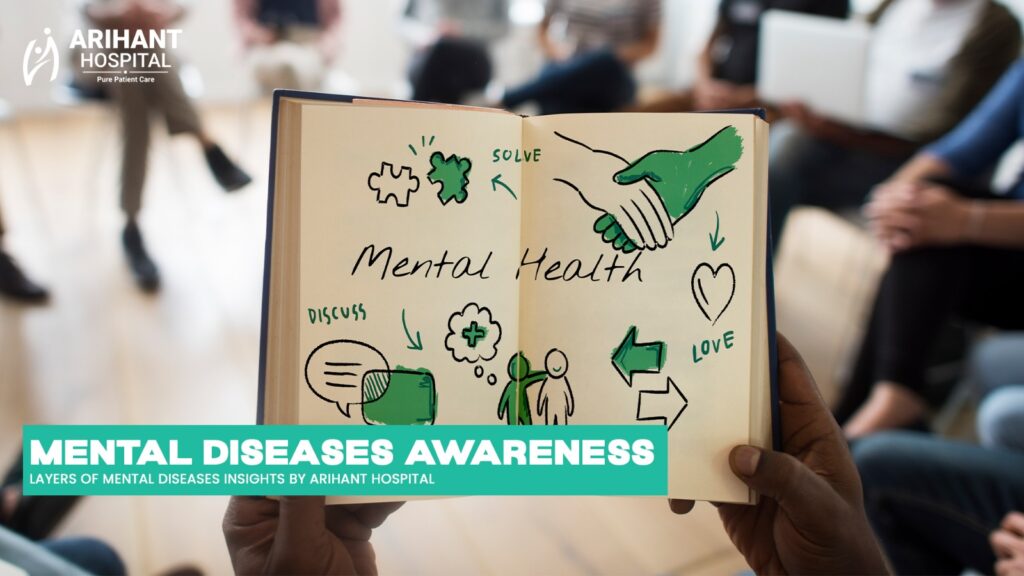Learning the Layers of Mental Diseases: Mental Diseases Awareness
Mental Diseases Awareness : In a world where mental health is gaining the attention it deserves, Dr. Rupali, a distinguished Neuro-Psychiatrist, provides profound insights into the realm of mental diseases. This comprehensive exploration navigates through the intricacies of mental disorders, focusing on depression as a pivotal aspect by Arihant Hospital Dehradun.
Understanding Mental Diseases
Mental Disease Overview
Dr. Rupali begins by laying the groundwork, offering a holistic view of mental diseases. These conditions, often underestimated, encompass a broad spectrum, affecting individuals across different age groups, socio-economic backgrounds, and genders.
Depression: A Pervasive Challenge
Drawing attention to depression, Dr. Rupali emphasizes its prevalence, particularly among individuals aged 12 to 60. The article explores the various facets of depression, shedding light on the interconnected factors contributing to its rise.
Factors Contributing to Depression
Sleep Loss, Anger, and Social Isolation
Dr. Rupali delves into the intricate relationship between mental diseases, particularly depression, and factors like sleep loss, uncontrolled anger, and social isolation. The article elucidates how these elements can act as triggers, exacerbating the challenges individuals face.
Lack of Hygiene: A Subtle Indicator
Highlighting a subtle yet crucial aspect, Dr. Rupali discusses the correlation between mental health and personal hygiene. The lack of attention to hygiene can serve as an indicator of an individual’s mental well-being, providing valuable insights for early intervention.
Neurotransmitters and Depression
The article delves into the neurobiological aspects of depression, exploring the role of neurotransmitters like serotonin and dopamine. Dr. Rupali explains how imbalances in these chemicals can significantly impact mood and contribute to the development of depressive disorders.
Medication and Its Role
Medicine as a Treatment Modality
Dr. Rupali elucidates the role of medication in managing mental diseases, particularly depression. The article provides an overview of commonly prescribed medications, emphasizing their impact on neurotransmitter regulation and overall symptom relief.
Symptoms Across Demographics
Symptoms in Children, Adults, and Females
Dr. Rupali categorizes and discusses the manifestations of depression symptoms across different demographics. Understanding the unique presentation of symptoms in children, adults, and females is crucial for tailored interventions.
Dispelling Depression Myths
The Silent Battle: Myths about Depression
The article confronts prevalent myths surrounding depression, such as the misconception that talking about it doesn’t help. Dr. Rupali provides evidence-backed insights, emphasizing the importance of open communication and destigmatizing mental health discussions.
Therapeutic Approaches
Beyond Medication: Therapies for Depression
Dr. Rupali explores non-pharmacological approaches to treating depression. The article introduces therapies such as Repetitive Transcranial Magnetic Stimulation (RTMS) and Transcranial Direct Current Stimulation (tDCS) as alternative modalities for managing depressive symptoms.
The Complex Interplay: Addiction and Depression
Addiction’s Contribution to Depression
The article addresses the intricate relationship between addiction and depression. Dr. Rupali discusses how substance abuse can amplify depressive symptoms and complicate treatment strategies.
Frequently Asked Questions (FAQs) about Mental Diseases Awareness
Q: Can depression be effectively treated with medication alone?
A: While medication can be an essential component of treatment, a comprehensive approach that includes therapy and lifestyle modifications is often more effective.
Q: Are children susceptible to depression?
A: Yes, children can experience depression, and early intervention is crucial for their well-being.
Q: How do therapies like RTMS and tDCS work in treating depression?
A: RTMS and tDCS are non-invasive brain stimulation techniques that aim to modulate neural activity and alleviate depressive symptoms.
Mental Diseases Awareness
Mental Diseases Awareness : Dr. Rupali’s expert insights provide a comprehensive understanding of mental diseases, with a specific focus on depression. From dissecting contributing factors and dispelling myths to exploring treatment modalities, this article serves as a valuable resource for individuals seeking clarity on the intricate landscape of mental health.



Leave a Reply